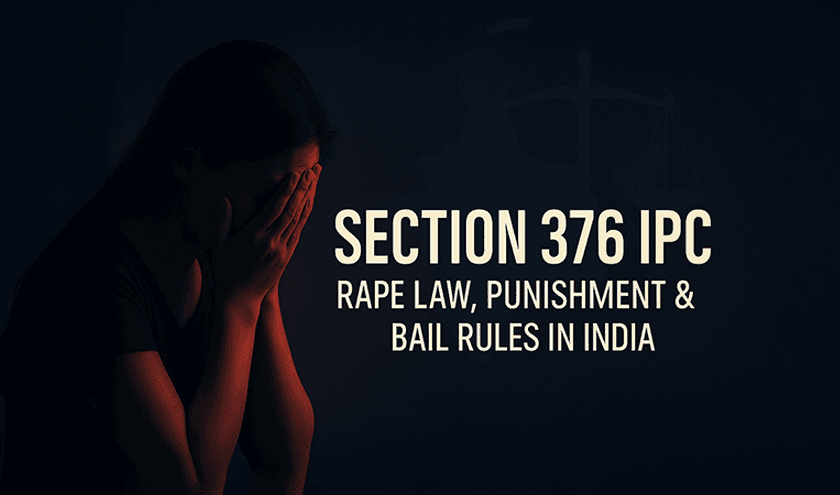Section 376 IPC: Rape Law, Punishment & Bail Rules in India

Introduction – Why Section 376 IPC Matters
Rape is one of the most serious crimes under Indian law, and it is specifically addressed under Section 376 of the Indian Penal Code (IPC). This provision lays down strict punishments for offenders, bail rules, and protections for victims. Over the years, especially after the 2012 Nirbhaya case, rape laws in India have been made stronger to ensure justice and deterrence.
However, Section 376 cases are not only emotionally overwhelming but also legally complex. Victims need justice, while those falsely accused must fight to protect their rights. In this blog, VakeelSaab’s criminal lawyers in India explain Section 376 IPC in simple terms—covering punishments, bail provisions, misconceptions, and practical steps for victims and accused.
What is Section 376 IPC?
Section 375 of the IPC defines rape, while Section 376 IPC prescribes its punishment. This law applies to both:
- General cases of rape (376(1))
- Aggravated cases (376(2)) such as rape by a police officer, public servant, hospital staff, or during custody
- Gang rape (376D), where the minimum punishment is even stricter
Important: After the Nirbhaya incident, the Criminal Law (Amendment) Act, 2013 was passed, introducing harsher punishments, faster trials, and better protection for survivors.
Section 376 Punishment in India
The punishment under Section 376 IPC is severe and varies depending on the circumstances.
- Basic Punishment: Minimum 10 years rigorous imprisonment, which may extend to life.
- Aggravated Cases: In situations like custodial rape, gang rape, or rape by a person in authority, punishment ranges from 20 years to life imprisonment.
- Extreme Cases: In rarest of rare cases, such as rape and murder, the death penalty may be awarded.
- Fines & Compensation: Courts often order fines, payable to the victim, as a form of compensation.
These punishments are meant to serve as a strong deterrent against crimes of sexual violence.
Bail Under Section 376 IPC
Bail in rape cases under Section 376 IPC is one of the most challenging aspects because:
- Section 376 is a non-bailable offense.
- Bail is granted only in exceptional cases.
- Courts generally deny bail to ensure justice for victims, but may consider it in situations such as:
- Weak evidence against the accused
- Accused being a minor/juvenile
- Delay or inconsistencies in investigation
Key Point: A well-drafted bail application and strong legal representation are critical. VakeelSaab criminal lawyers in Delhi and across India help prepare and argue bail applications effectively.
Common Issues & Misconceptions
Many myths surround Section 376 IPC. Here are a few clarifications:
- False Cases: Sometimes Section 376 is misused in personal disputes. Courts carefully analyze such cases, and the accused must present strong evidence to prove innocence.
- Delay in FIR: Delay in filing an FIR does not automatically weaken the victim’s case, as courts recognize trauma and fear faced by survivors.
- Victim Identity Protection: Under Section 228A IPC, the identity of rape victims cannot be disclosed, and doing so is punishable by law.
What To Do in a Section 376 IPC Case
If You’re a Victim:
- File an FIR at the nearest police station without delay.
- Undergo a medical examination to record evidence.
- Seek emotional and legal support. VakeelSaab criminal lawyers can guide you through the legal process.
If You’re the Accused:
- Stay calm and do not panic.
- Contact a criminal lawyer immediately.
- Apply for anticipatory bail if an FIR is likely.
- Collect all possible evidence such as messages, documents, and witnesses that may support your defense.
For Families:
- Offer emotional support to the victim or accused.
- Avoid confrontations with the opposite party.
- Take professional help through VakeelSaab’s online lawyer consultation to understand the next steps.
Role of Criminal Lawyers in Section 376 Cases
A criminal lawyer’s role is vital in Section 376 cases, whether you are a victim or an accused. Lawyers help with:
- Drafting and filing FIRs correctly
- Preparing bail applications
- Representing clients in trial and appeals
- Ensuring victims get justice and accused get a fair trial
- Offering confidential and affordable online consultations through VakeelSaab
Why Choose VakeelSaab for Criminal Cases?
When facing a Section 376 IPC case, having the right lawyer can make a huge difference. VakeelSaab offers access to verified criminal lawyers across India, including Delhi. Our lawyers provide transparent fees, confidential online consultations, and strong courtroom representation. Whether you are a victim seeking justice or an accused defending your rights, VakeelSaab is here to help.
FAQs on Section 376 IPC
Q1. What is the minimum punishment under Section 376 IPC? The minimum punishment is 10 years of rigorous imprisonment, which may extend to life.
Q2. Can bail be granted in Section 376 IPC cases? Yes, but bail is rare and only granted in exceptional cases.
Q3. Can false rape cases be challenged? Yes. With proper evidence and representation, false cases can be quashed.
Q4. Who can help with a Section 376 IPC case in Delhi? You can consult VakeelSaab criminal lawyers in Delhi for expert support, bail assistance, and representation.
Related Articles
The Importance of Consulting a Property Lawyer for Real Estate Issues
Blog
How to File a POCSO Complaint in India: Step-by-Step Legal Process
Blog
What punishments does the law give for giving, taking, or asking for dowry?
Blog
Reasons for the Increasing Divorce Rates in India
Blog
What is a Special Leave Petition? Meaning, Features, Process & & Who Can File?
Blog
What Is the Difference Between Mutual Divorce and Contested Divorce?
Blog